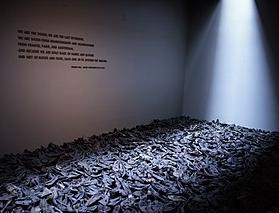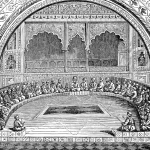
As I have seen news reports of Daesh being responsible for terror attacks against Muslims during the final days of Ramadan, I have been heartbroken. Not only because this is a sad and horrible thing; but also because, while many will hear of these things and mourn with those who mourn, many others will not. There have been and will continue to be those who think it doesn’t matter in the same way as it does when Westerners and Christians are victims of similar attacks, those who say that these things are normal for the Islamic World, those who blame Islam. But most of all because this is wrong. This is not the world God made, it is a world in the process of unmaking itself. And we must mourn, we must pray and we must live in accord with the grace that even now wants to redeem that world. The grace in our midst that is so hard to see, to listen to, to acknowledge in the face of so much evil.
I ask you mourn for this. Not to point fingers, nor to blame those who do choose to point fingers. But to hear of such tragedies as though they were our own. If news like this does not strike you, or seems distant, or seems like an Islamic problem, not a part of the Christian World or secular West – then you can ask yourself what I found myself asking. How would I feel if instead of Medina during Ramadan, it had been the Vatican during Holy Week? How horrified would I be if instead of coming from a group calling itself “Islamic State” such attacks were coming from a group calling itself “Christendom”? If it were Washington, DC instead of Baghdad? The answers to such disturbing questions tell us, I think, how we – as Christians, as Westerns, as the people of the US – should see and hear accounts of such horrors as these.
I also encourage you to read what
“How do we feel when the actions of a few racist or fringe groups are taken to represent all of us? How do we feel when all Catholics are presumed to permit sex crimes against children, because of the vile and abusive behavior of a few priests, and the perfidious bishops who protected them?
What good do we hope to do, by opposing all Muslims, when we could more profitably – and more virtuously – stand with them, pledging to protect and respect one another?
This is not the place to delve into the history of Islam, to determine whether or not the religion is intrinsically dedicated to violence, to weigh the virtues or vices of the religion’s founder. Traditions are alive, and texts become what their readers make of them, in their reading, in their understanding of how to interpret figures of speech, with hermeneutics that develop both organically and academically throughout the centuries. Texts mean what they mean because of praxis, too: how we live them out, or try to. And traditions of hermeneutic differ. If violent extremists seek through their actions to create Islam as a force for nihilism in the contemporary age, let us pray with those who oppose them that the actions of the peaceful, the tolerant, the merciful will endure and triumph. Don’t let the violent determine our meanings. It’s bad enough that the violent forge history – let them not forge the poetry of usage, the metaphor of ritual, as well.” (Read the rest here.)
















